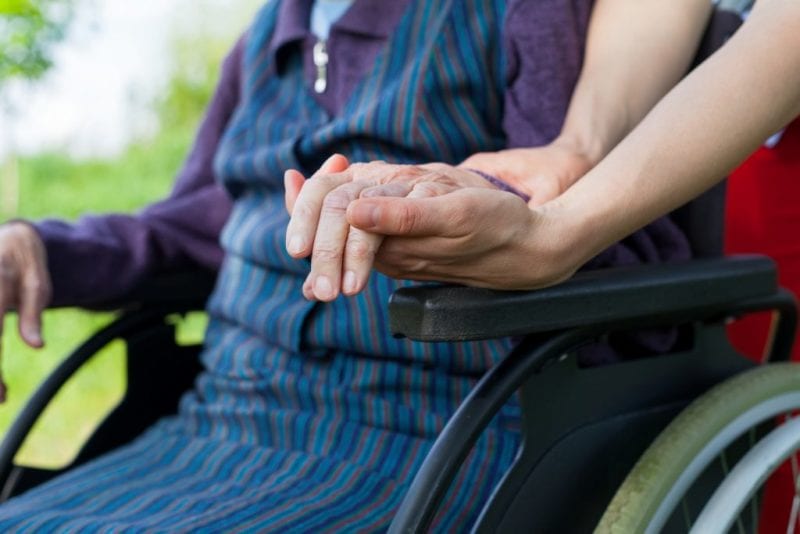Parkinson’s disease (PD) is a progressive disorder that affects nerve cells in the brain that responsible for body movement.
When working with seniors who have Parkinson’s, TPC’s physios focus on helping to reduce symptoms involved and, in doing so, improve our clients’ quality of life for as long as possible.
Treating the symptoms of Parkinson’s disease isn’t simply a matter of conducting a physio session; it’s important to help the client keep their spirits up. And sometimes it’s a left-field approach that generates the best results.
One client we’ve worked with springs to mind. A gentleman named Nev, who had a passion for Aussie rules footy. To make sessions with Nev more engaging and fun, his TPC physio, Robyn, would always bring a footy to use for exercise therapy.. So, his TPC Physio, Robyn, always took a footy with her to their treatment sessions. Robyn usually brought a small, soft, pink footy – belonging to her three young daughters – to use for exercises.
One day, Robyn forgot the footy and – thinking on her feet – borrowed a small soccer ball from a storeroom at the aged care facility where Nev lived.
Coming from Australia’s northern states, Robyn hadn’t thought what a footy-mad Victorian would make of this.
Well, for Nev, this was big! Cue mock outrage! Although Nev’s day-to-day ability to show emotion was diminishing, the sight of an interstate physio trying to handball a soccer ball to him like it was AFL footy had him in fits of laughter! Sometimes it’s the little things when we’re working with our senior clients that make the biggest difference!
Keep moving
Hand balling is an excellent exercise for Parkinson’s sufferers, as is laughing, dancing, stepping, golf and boxing (for the right client!). Anything that tests rotation and cross-body coordination helps to keep the trunk mobile, extended and rotating – and helps to strengthen the muscles that suffer as the disease takes hold.
The degenerative nature of Parkinson’s means symptoms will worsen as time goes on, presenting a huge physical and mental challenge.
When devising a tailored program to help clients feel physically strong, our physios do so knowing they’re not tackling this process alone. From early diagnosis, our physios create and educate a support team consisting of family, friends and carers. The programs specifically target strength and balance, as well as attempting to retain general endurance and fitness levels.

The symptoms of Parkinsons’ Disease (PD) vary
The symptoms of Parkinson’s vary from person to person, as does the rate of progression. But a person who has Parkinson’s may experience some of these more common symptoms:
- Bradykinesia: Slowness of movement and decreased control of their hands.
- Tremor at rest: Involuntary shaking that decreases with purposeful movement.
- Rigidity: Stiffness caused by an increase in muscle tone.
- Postural instability: A feeling of being unbalanced which people often compensate for by lowering their centre of gravity, or bending down, that results in a stooped posture and a changed way of walking that increases the risk of falling.
Some people work best with audio cues, others with visual cues
Different methods work with different clients, so we experiment to find what works for each person. For instance, coloured electrical tape stuck on the floor in as lines to guide a client where to land their heel with big steps while walking can be a great help to avoid the shuffling and stooping that often comes with PD.
Messages from the brain to the body do slow with the progression of Parkinson’s, and movement stops being an automated instruction.
We need to give the brain a helping hand when our autopilot is playing up. We help the brain and the body by trying to retrain how to do these things easier. For example, clients often speak out loud to remind themselves to “take big steps, swing my arms” – perhaps even to a favourite song. Music is often a great help for people with Parkinson’s!
It’s about incorporating life as it has always been into physio treatment – and having fun!
Back to our soccer star Robyn! She also worked with another gentleman with Parkinson’s who had poor mobility and kept falling. Before PD, he had been very fit and enjoyed swimming with his wife in their pool at home.
You can imagine how keenly he felt the loss of his fitness, so Robyn helped him safely get back into a pool and swimming with his wife. He loved doing his shoulder and back exercises in the pool.
A diagnosis of Parkinson’s disease is certainly life-changing, but it doesn’t have to be earth-shattering. Movement is one of the keys to managing PD as best as possible. With help from a TPC physio, it can be tackled with a solid game plan (whatever your preferred code of football!).
Interested in knowing more?
Please call on 1300 797 793 or email us at [email protected] 🙂



 1300 797 793
1300 797 793